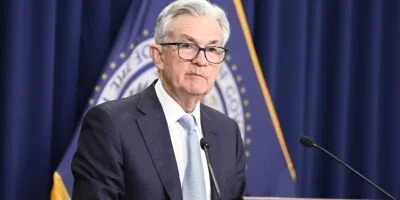DeSantis Takes the Lead on Fed Reforms

Of all the declared Republican presidential candidates, none has taken a tougher stance on the Federal Reserve than Governor Ron DeSantis. He’s criticized monetary policymakers for permitting rampant inflation. He’s defended the rights of crypto enthusiasts to own and transact digital assets free from heavy-handed regulators at the Fed and elsewhere. And he’s come down hard against a central bank digital currency (CBDC), which poses great threats to financial privacy and freedom.
Except for inflation, these might seem like esoteric policy concerns of little interest to average voters. But the issue profiles are waxing. Americans are increasingly aware just how dangerous the Fed is to national wellbeing. Elected officials, who are supposed to control the government, should absolutely be sounding the alarm about our renegade central bank.
On inflation, the governor’s conventional take is the right one. The Fed’s rampant money-printing “obviously is going to create inflationary pressures,” DeSantis remarked before his formal campaign launch. Since then, he’s also castigated Congress and President Biden for contributing to inflation through excessive spending, which pressured the Fed to monetize the debt. Prominent economists, including Nobel laureates, agree that fiscal follies encourage money mischief. Reforming the Fed and getting spending under control are necessary to protect American households from crippling dollar depreciation.
DeSantis’s defense of bitcoin users is also an important indicator of his monetary policy positions. His Twitter Spaces campaign launch was widely panned for its technical difficulties and wonky policy discussions. But it demonstrated the governor is well aware of the dangers of grasping regulators, who want to crush any alternative to a government-approved payments system. According to DeSantis, political elites want to “regulate [bitcoin] out of existence” because it threatens their plans for social control. He’s right. The decentralized, anonymous nature of the bitcoin protocol is an obstacle for the politicians and bureaucrats who view markets as their personal chessboard.
That brings us to CBDC. DeSantis recognizes the perils of a government-controlled payments system, which CBDC basically is. Giving the state the ability to monitor private financial transactions and selectively process them is a recipe for disaster. That power would inevitably be abused towards partisan ends. Nobody should have the “power to shut off access to your hard-earned money because they disagree with your politics,” the governor declared. Clearly he means it: He recently signed legislation that prohibits CBDC use as money under Florida’s Uniform Commercial Code. While a single state government’s actions are unlikely to thwart Uncle Sam’s CBDC plans, it’s a step in the right direction—and an encouraging indicator of how DeSantis would handle these issues if elected.
Other Republican candidates have exhibited welcome Fed-skepticism. Vivek Ramaswamy proposed a commodity-price rule for monetary policy and harshly criticized CBDC. Tim Scott lambasted Fed Chairman Powell about inflation and condemned major regulatory failures following Silicon Valley Bank’s collapse. But DeSantis is a step ahead of them all. He sees most clearly the hazards of an unaccountable Fed with a stranglehold on the economy’s commanding heights. This likely stems from his experience as a public chief executive. Governors who want their administrations to succeed must discipline rogue bureaucrats, and DeSantis’s administration has been more successful than most.
To protect American households and businesses, we need a thorough overhaul of the Fed’s monetary and regulatory operations. Only a candidate with both a breadth of vision and a grasp of policy minutiae can credibility commit to fixing the Fed. Time will tell which Republican is best prepared to tackle Fed reform, but as things stand now, DeSantis is the most plausible contender.









